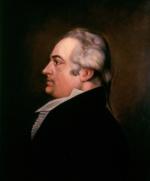Ninian Edwards (1775-1833)
Ninian Edwards was born in Montgomery County, Maryland on March 17, 1775 to Benjamin and Margaret Edwards, a well-connected political family. He attended Dickinson with the class of 1792 but left before the completion of his degree and took up the study of law.
In 1795 he was in Kentucky, managing family property there and entering state politics with immediate success. He was elected to the legislature before he was eligible to vote. In 1803, he was appointed to the bench and four years later became the chief justice of the Kentucky Court of Appeals.
In 1809, James Madison appointed Edwards as the first governor of the newly-formed Illinois Territory. He served in the formative years of government for the territory, forming the political structure which would accompany statehood in 1818. He became the new state's senator in 1819. He resigned in 1824 upon his appointment by President Monroe as minister to Mexico; however, he was never able to assume the post due to a scandal stemming from a public argument with the current secretary of the Treasury. Edwards returned to Illinois where he was elected governor in 1826. His popularity waned and he did not seek re-election in 1830. His career ended with defeat in a run for Congress in 1832.

